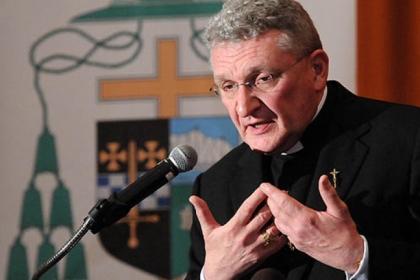Pope's Resignation Surprises Pittsburgh Area Catholics, Bishop Zubik
By Ann Rodgers
The announcement by Pope Benedict XVI that he would step down Feb. 28 came as a surprise to many. Even people with insider connections at the Vatican were blindsided by the news. Nothing was posted on Catholic news media sites. The Rev. Louis Vallone, a pastor in McKees Rocks who is a close friend of Cardinal Daniel DiNardo of Galveston-Houston, had spoken to him last week when the cardinal was in Rome and heard no hint of any major impending change. "It caught everybody off guard," said Bishop David Zubik of Pittsburgh, who heard it from the TV news on his way to early morning Mass at St. Paul's seminary in Pittsburgh's East Carnegie neighborhood. "There is a certain sadness I feel because of his resignation. I do admire him. I admire the teaching that he shared so much with the church. I think he wouldn't come to a decision that was as important as this one without a considerable amount of prayer. He wants only the very best for the church and would submit his resignation based on his love for the church." On his last visit to Rome in October he had noticed the pope looking dramatically more frail, Bishop Zubik said. "It was very clear that he was becoming physically weaker and weaker," Bishop Zubik said. "He had to be helped with two people standing on both sides. But his mind continues to be very strong, there is no question about that." A little more than an hour after that interview, Bishop Zubik began a press conference held at the seminary in East Carnegie, where a picture of Pope Benedict hung by the front doors of an auditorium. He read the pope's statement, released just a few hours earlier. "Personally, I have to say this is a statement that only increases my admiration for Pope Benedict," Bishop Zubik said, saying it demonstrated the leader's love for his church. Bishop Zubik said he will always hold "a special place in my heart" for Pope Benedict because he assigned the bishop back to Pittsburgh. The bishop was in Rome in April of 2005 to watch as the white smoke rose to signify the election of Cardinal Joseph Ratzinger as pope, and said by happenstance, he will be in Rome visiting seminarians the week Pope Benedict retires. He said he will call on the Diocese of Pittsburgh to observe a spirit of prayer as Pope Benedict resigns and "to remember in a special way" the college of cardinals who will elect the next pope. Father Vallone believed that Pope Benedict had been planning this for some time because of personnel changes he had made at the Vatican and his efforts to make sure there was a full college of cardinals by holding two consistories in one year. "Here you have someone who has done the exact opposite of what his predecessor has done," Father Vallone said. "As his health failed, Pope John Paul II chose to stay on as a symbol of courage to those who are elderly and sick. There were a lot of changes that occurred in his last years that he may not have been on top of. Pope Benedict is saying that the witness or value of staying until you die in this day and age can cause many problems for the church. He is willing to hand over the guidance of the church saying he doesn't have the strength of mind and body that are necessary. Pope John Paul evidenced one type of courage, Pope Benedict is evidencing another." Pope Benedict was one of the most elderly popes ever elected, at the age of 78. That is three years past the mandatory retirement age for priests, though cardinals typically serve until they are 80 and no longer eligible to vote in a papal election. According to the Rev. Thomas Reese, a Jesuit political scientist at Georgetown University who studies the church hierarchy, as many as 10 popes may have resigned but the historical evidence is limited. The most recent was in the 15th century when Pope Gregory VII resigned to bring an end to a schism in the western church. The most famous resignation was that of Pope Celestine V in 1294 "because Dante placed him in hell for it," Reese said. Modern popes have rejected the idea. Pope Paul VI, who died in 1978, said that paternity could not be resigned and feared setting a precedent that would lead factions in the church to press future popes to resign. Pope John Paul II established regulations for a papal resignation and in 1989 and 1994 he prepared letters offering his resignation in the case of a disability that would prevent him from carrying out his ministry, Reese said. Many observers believed that age and a series of disabilities allowed Pope John Paul II to become so isolated that he was not able to respond effectively to the sexual abuse crises in the church. Although Pope Benedict has been criticized for how he handled some cases as a bishop in Germany and early in his tenure as an official in Rome, at the end of Pope John Paul's pontificate it was then-Cardinal Joseph Ratzinger who pursued a case against a child molester with powerful Vatican connections, the Rev. Marcial Maciel Degollado. As pope, he forced Father Maciel from ministry and ordered a clean-up of the religious order he had founded. Contact: arodgers@post-gazette.com
|
.
Any original material on these pages is copyright © BishopAccountability.org 2004. Reproduce freely with attribution.
